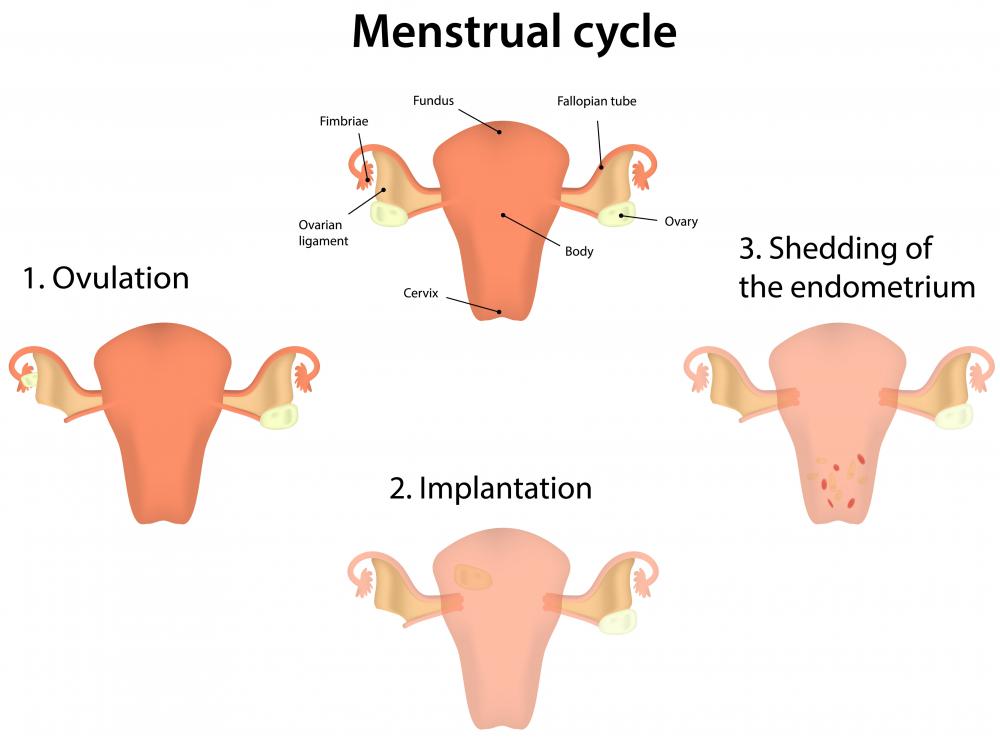At WiseGEEK, we're committed to delivering accurate, trustworthy information. Our expert-authored content is rigorously fact-checked and sourced from credible authorities. Discover how we uphold the highest standards in providing you with reliable knowledge.
What Is Vaginal Mucus?
Vaginal mucus, also called vaginal discharge or cervical mucus, is produced by the cervix to clean the vaginal area and protect it from bacteria, viruses and other foreign objects. The amount of mucus produced by a woman's body varies during ovulation and menstruation and can indicate fertility. Outside factors can also influence the amount of mucus produced. In some cases, changes to the vaginal mucus can indicate an infection or other illness.
All vaginal discharge is produced by glands in the cervix. Mucus is most common in women of child bearing age. As women age and go through menopoause, the amount of vaginal mucus produced by their bodies decreases.

Depending on the stage of a woman's monthly cycle, vaginal mucus can vary in color, consistency and thickness. The mucus is clear when it is produced but usually turns white or yellow in color when it leaves the body. As her cycle begins each month, a woman may notice that her mucus is very thick and white. As she begins to ovulate, the discharge becomes clearer and more elastic in texture.

If a woman wishes to become pregnant, she can track the changes in her cervical mucus over a period of months to learn when the best time to attempt pregnancy is. Since the discharge changes in quality during ovulation, a woman can learn to recognize the quality of her mucus when she is ovulating compared to just after her period or at other times in her cycle. During her cycle, a woman can collect samples of mucus throughout the month.

Taking birth control or certain medications can reduce the amount of discharge or mucus produced by the body. If a woman is stressed, she may notice that her body produces more mucus than usual. Sexual arousal can also increase the amount of mucus produced.
Changes to vaginal mucus can indicate problems in the body as well. If the mucus becomes very thick, is white in color and is accompanied by itching, it usually indicates a yeast infection. Greenish or yellow mucus may suggest that a woman has a bacterial infection. Bacteria may also cause the mucus to have an unpleasant scent.

Immediately following menstruation, vaginal mucus may be dark or brownish in color. The mucus is removing any remaining menstrual blood from the body. A brownish discharge at the time when a woman usually menstruates, instead of her usual flow, may mean that she is pregnant.
AS FEATURED ON:
AS FEATURED ON:

















Discussion Comments
@MrsWinslow - I had trouble noticing fertile-quality mucus as well. If your mucus is sticky, you might try taking cough syrup. It has to be plain Robitussin - no letters or anything like that. The expectorant will thin out your mucus and can help with pregnancy. Look at a book like Taking Charge of Your Fertility for more information on the Robitussin method.
Another thing that can dry up your mucus is taking antihistamines. If you're currently on them, you might want to see if you can take a different medication while you try to conceive.
To answer the question you actually asked - if there is another way to tell when you're fertile - absolutely, there is, but you might not like it! It involves getting up close and personal with your cervix. When it is firm and closed (feels like the tip of your nose), you are probably not fertile. When it feels softer and more open (like your lips) then you may be getting close. Again, Taking Charge of Your Fertility can give you more info.
I've been reading about the fertility awareness method (FAM) which involves using your cervical mucus to predict your fertility either achieve or avoid pregnancy.
Now, I definitely want to *achieve* pregnancy! But after a few months, I still don't really notice the nice "egg white" cervical mucus they tell indicate you are fertile. Just a variety of different sticky kinds.
Are there other ways to tell that you are fertile? My cycles are irregular, so I can't just assume that days 12-15 of my cycle, for instance, are the best days.
Post your comments